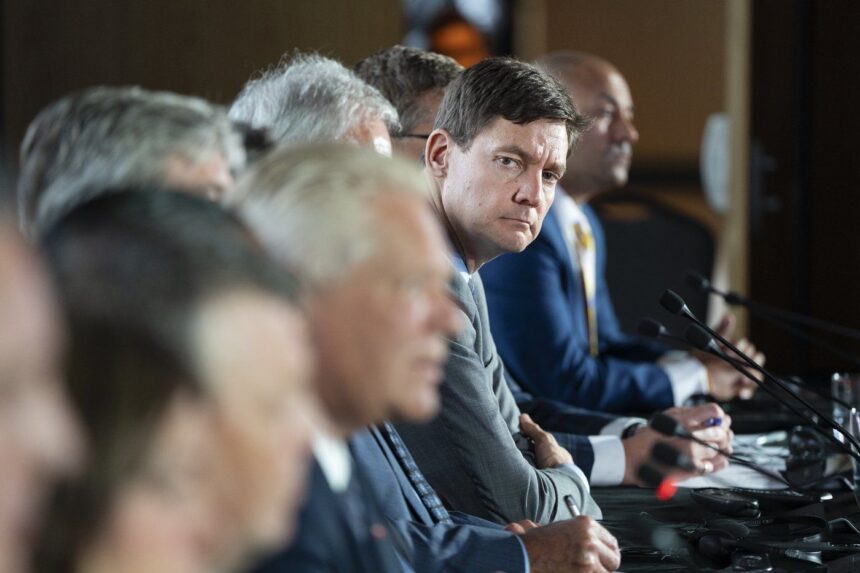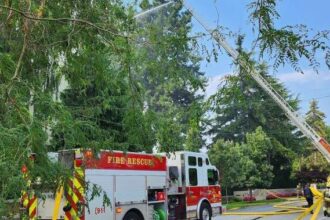In a tense cross-provincial standoff that has intensified this week, British Columbia Premier David Eby has doubled down on his rejection of Ontario Premier Doug Ford’s ambitious western pipeline proposal, declaring the matter “definitively closed” despite mounting pressure from eastern provinces facing energy constraints.
“I’ve been crystal clear from day one – British Columbia will not sacrifice its environmental protections and Indigenous reconciliation commitments for this project,” Premier Eby stated during Tuesday’s press conference in Victoria, visibly frustrated by what he characterized as “persistent lobbying” from Ontario. “The Supreme Court decisions supporting Indigenous rights aren’t suggestions; they’re binding law.”
The disputed pipeline would have created a new energy corridor through sensitive ecological regions of British Columbia, aimed at transporting Alberta natural gas resources to eastern Canadian markets. Ford’s administration has aggressively promoted the project as essential for Ontario’s manufacturing sector, which continues to struggle with elevated energy costs that manufacturers claim have reduced their competitive edge against American counterparts.
At the heart of the conflict lies a fundamental disagreement about Canada’s energy future. While Ford’s economic vision emphasizes resource development and energy security, Eby’s government has committed to stringent environmental protections and meaningful consultation with First Nations communities, many of whom have voiced strong opposition to the proposed pipeline.
“We’ve spent nearly three years conducting thorough environmental assessments and consulting with affected communities,” explained BC Environment Minister George Heyman. “The potential risks to salmon-bearing waterways and critical habitat simply outweigh the projected economic benefits.”
The interprovincial tension has sparked renewed debate about federal jurisdiction over cross-provincial infrastructure projects. Federal Natural Resources Minister Jonathan Wilkinson has thus far declined to intervene directly, though sources within the ministry suggest that behind-the-scenes negotiations continue.
“This isn’t just about provincial politics,” remarked Dr. Samantha Chen, energy policy expert at the University of British Columbia. “We’re witnessing a fundamental collision between competing visions of Canada’s economic and environmental future, with Indigenous rights properly positioned at the center of the conversation.”
Industry analysts note that Ford’s aggressive push comes amid Ontario’s manufacturing slowdown, with the province losing an estimated 28,000 manufacturing jobs in the past eighteen months. The Ontario Manufacturing Council has pointed to energy costs as a primary factor, claiming prices approximately 32% higher than neighboring American states.
“The reality is that eastern Canada needs affordable energy solutions,” said Ontario Economic Development Minister Victor Fedeli. “British Columbia’s intransigence affects real families and communities across multiple provinces.”
Meanwhile, several First Nations groups along the proposed route have praised Eby’s stance. “This isn’t about being anti-development,” clarified Chief Miranda Williams of the Takla Nation. “It’s about meaningful consultation and consent, not checking boxes after decisions have already been made.”
Environmental organizations have also rallied behind BC’s position, highlighting that the decision aligns with Canada’s climate commitments. A coalition of seventeen environmental groups issued a joint statement yesterday supporting the rejection while urging greater investment in renewable energy infrastructure.
Premier Ford, speaking to reporters in Toronto this morning, showed no signs of backing down. “This pipeline would benefit all Canadians, including British Columbians. Premier Eby needs to think beyond provincial borders. This is about national energy security and economic prosperity.”
The standoff raises important questions about Canada’s ability to balance resource development with environmental protection and Indigenous rights in an increasingly complex energy landscape. As climate pressures mount alongside economic concerns, can our federation find a path forward that respects both provincial autonomy and national interests?
























